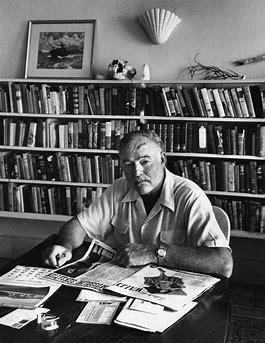Hemingway Wrote Some True Sentences
Most of us Americans, and many of the world: we know the works of Ernest Hemingway. He had a way with words. That is an understatement. I read some of his books while in my high school days, the time of secondary education, as it is called. Primary was over, it was time to grow up. Live and learn and know the sentences that make us who we are. That is a part of maturation and understanding. Becoming part of who we are, self-realization, or what we know and think as individuals and societies, running through the sentences, the stories, the books, the recurring universal themes of Ernest Hemingway. He won the Pulitzer Prize, the Nobel Prize for Literature. His books and stories accompany much of our present patterns and themes, some decades or a century later. One of our nation's and world's masters.
I read For Whom the Bell Tolls, The Old Man and the Sea, and The Garden of Eden. An okay sampling. I should have read more. Like anything, some parts or randomized portions are not enough. A couple summers later, I checked out a large anthology of short stories by Ernest Hemingway. He wrote of a young man in Michigan, Nick, who would fish and hunt and live outdoors and experience life.
An analogy and an allegory for all of us. We grow up simple; some of us move on to more complex places and stations. But, we never truly leave the young person within. We carry ourselves with us. We can change, but mostly we do not.
Hemingway changed and matured through the World Wars, being damaged and healing in an Italian hospital, falling in love, returning to the peacetime and living in Paris, and Europe, especially Spain, and later Florida and Cuba, and places wild in the African continent. But he was still the young man Nick all along. He suffered tremendous concussive blows in those decades, that would lead to his eventual premature and tragic death. Depression and despair are one thing, heavy brain concussions are another. He ended his life under this duress. One particular blow in France with a military jeep was severe. A biographer concluded that drinking too much did not help either.
I read a long biography of Hemingway a few short years ago. I have read his ubiquitous A Farewell to Arms and The Sun Also Rises, and I have labored with his likely under-estimated or under-appreciated Death in the Afternoon. I wrote on one of his most famous short stories in college, A Clean, Well-Lighted Place. I think that I received an A on the paper that I wrote in Spanish for my Mexican professor, himself a cuentista, or short story writer.
Hemingway is an icon and a brand, a style and a tour-de-force. With many true sentences, albeit fictionalized and crafted from his imagination, much of the time.
Throughout it all he was the same young man discovering the world, one fish cast and boat trip at a time. One true sentence at a time.
This is the story of us. The true sentences that he penned or penciled ring true with millions of us. His stories-- of a bull in the stadium of Spain, or a fisherman pulling in a large haul, or trying to, or an intrepid soldier finding the bridge to destroy behind enemy lines in an awful civil war: all of it reverberates and resonates in our hearts and intellects, one true sentence at a time.
May we find that young outdoorsman, that ambulance driver, that fisherman, that lover, that person of strength and courage, young or old, within us. May we let the true sentences of humanity and God rise up with and within us, and seep and distill into us, pushing us to who and where we need to be.
One true sentence at a time.

No comments:
Post a Comment